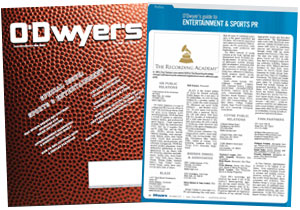|
|
Thus far, the 21st Century has been a good one for the sports business, if you disregard Russia using the Olympics as a propaganda vehicle and invading the Ukraine immediately after the conclusion of the Sochi Olympics and the country’s crackdown on human rights. Or, if you’re so enamored by football that life-altering concussions and spousal abuse in the National Football League are accepted as the cost of doing business. Or, if you don’t see anything wrong with Major League Baseball using thug-like tactics to get A-Rod, while giving “stand in the corner” punishments to other PED users.
History also shows that if you’re a sponsor of sports you don’t see anything wrong, or if you do, you keep it to yourself.
|
|
Big business is famous for patting itself on the back, and for its propaganda-like statements that have no bearing on reality. Among the most famous is the bygone Wall Street yarn that by “investing in a piece of America,” you can get rich. The truth is, the people who get rich are the brokers and other “financial experts” who sell their products to naïve buyers. But Wall Street isn’t the only business that doesn’t mind being disingenuous with its customers regarding its public relations and advertising messages. So are many of the Fortune 500 companies that provide the money that fuels the sports craze.
In a virtual tie with their investment sellers’ propaganda-spouting allies are the major sponsors of sporting events, especially those tied to the Olympics, whose “we’re supporting our athletes” declarations camouflage the real reason these companies are spending millions of dollars on athletic events: they hope it will lead to product sales.
But there’s also another commonality that the NFL and Olympics sponsors have, by spending billions of dollars on the Big Business of Sports: they’re not demanding that the ruling bodies of the sports cabals clean up their acts — and I don’t mean like the ludicrous public relations stunts of MLB to rid its game of steroid users or the NFL by asking the advice of female experts about its player’s sexual abuse incidents. (Did the NFL have to hire women to make NFL commissioner Roger Goodell and team owners know that slugging a woman was wrong? All they had to do was ask their wives and daughters. Or maybe they used the same disingenuous reasoning for decades that by ignoring concussions, no one will notice that they occur.)
Of course, sports have always been a magnet for brands that are now considered detrimental or unhealthy. Tobacco and alcoholic products were once frequent sponsors of sporting events, and even today the latter remains tied together at the umbilical cord. And now that fantasy sports gambling has joined the list, sports cabals remain tight-lipped while commercials on the telecasts of their games encourage betting.
But it has only been since the audience reach of television that brands have begun spending billions supporting the International Olympic Committee and the NFL, regardless of the Machiavellian and less than sportsmanlike conduct of those organizations. This situation will not change unless sponsors do more than just make meaningless PR statements and put their advertising dollars into other activities. Until that happens (and it did happen to prize fighting) don’t expect to see sportsmanship in these sports.
The NFL and Olympics are not the only organizations that attract sponsors despite their unsavory activities. Joining them are MLB, the National Hockey League, the National Basketball Association, NASCAR and the so-called amateur sports scene, college athletics. But the latter five enterprises pale in comparison to the attraction that the Olympics and football have on their sponsor-enablers.
The anything goes Teflon acts of the Big Business of Sports entities and damaging effects it has on our society are well known. They range from excusing and welcoming back athletes numerous times for acts that would cost you or me our jobs after one offense to hiring former athletes as broadcasters, even though they have been in trouble with the law. Sports sponsors and leagues help in glorifying an athlete despite off-the-field misconduct acts.
The leagues are prime vehicles for beer companies, non-alcoholic beverages and snack foods to position their brands as fun products, nutritional and medical research to the contrary. Only government regulations prevent the leagues from approving tobacco products for sponsorships, as they did for years prior to the ban.
During my sports reporting and PR marketing career, sports have been promoted as if it is all milk and honey. That would be nice, if true. But the many actions of athletes, team owners, leagues, coaches and governments disprove that depiction of sports.
The latest hypocrisy of the image sports tries to portray was unveiled by The New York Times, whose reporting revealed that MLB, the NFL, NBA and team owners have official relationships with the unregulated gambling of online fantasy sites. (The Wall Street Journal reporting about the fantasy sites is covered like an industry and is relegated to its business section, which makes sense because betting on the sites isn’t a sport.) Even though the leagues vociferously proclaim they are against betting, they have always encouraged it, baseball by announcing starting pitchers ahead of games and football by making public injuries to players, which, of course, enables odds makers to set the line.
Reality shows that sports isn’t and never was what athletic cabals, marketers, PR and ad agencies portray it as: An integral element of society that brings out the best in people, or as the NFL does by its over the-top patriotic image. Better that instead of wrapping itself around the American flag, they should show their appreciation to the military by hiring veterans.
Big Sports couldn’t disseminate its propaganda without their enablers: The advertising industry, the media, and sponsors and, of course, the public relations business. There is more than enough shame to be shared by all.
* * *
Arthur Solomon, a former journalist, was a Senior Vice President and senior counselor at Burson-Marsteller, and is currently a frequent contributor to public relations and sports publications.




 Brunswick Group handles Endeavor, which has launched a review of strategic alternatives at the sports and entertainment combine as CEO Ari Emanuel believes Wall Street undervalues his company.
Brunswick Group handles Endeavor, which has launched a review of strategic alternatives at the sports and entertainment combine as CEO Ari Emanuel believes Wall Street undervalues his company. MWWPR has been retained by SportBLX to lead communications for the launch of a platform that allows fans and investors to own shares of unique assets in sports.
MWWPR has been retained by SportBLX to lead communications for the launch of a platform that allows fans and investors to own shares of unique assets in sports. DraftKings is betting on Donald Trump-connected Ballard Partners to help it achieve its economic development and regulatory relief goals in Washington. (1 reader comment)
DraftKings is betting on Donald Trump-connected Ballard Partners to help it achieve its economic development and regulatory relief goals in Washington. (1 reader comment) On November 15, “Ford v Ferrari” will roar into theaters, packing a publicity boost for two great global auto brands right on the marquee. Here's a Top Ten list of films in which a brand played a starring role. (1 reader comment)
On November 15, “Ford v Ferrari” will roar into theaters, packing a publicity boost for two great global auto brands right on the marquee. Here's a Top Ten list of films in which a brand played a starring role. (1 reader comment) Steven Spielberg’s Amblin Partners has brought on Dan Berger as executive vice president and head of communications.
Steven Spielberg’s Amblin Partners has brought on Dan Berger as executive vice president and head of communications.


 Have a comment? Send it to
Have a comment? Send it to 
No comments have been submitted for this story yet.